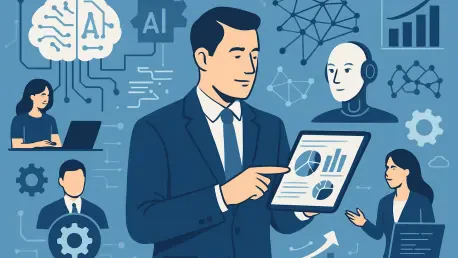In the rapidly evolving digital landscape of 2025, Artificial Intelligence (AI) stands as a catalyst for unprecedented change, reshaping the roles within organizations, particularly that of the Chief Information Officer (CIO). With technology revolutionizing industries, CIOs are transitioning from operational overseers to strategic business leaders, driving innovation and organizational transformation. This report delves into the shifting dynamics of the CIO role, set against a backdrop of technological advancement, highlighting the pivotal influence of AI on current and future roles of CIOs.
Industry Overview and Current Landscape
The integration of AI is redefining the CIO’s position, turning them into central figures in steering organizational strategy. The traditional functions involving IT infrastructure and cybersecurity are now being complemented by proactive engagement in business innovation, digital transformation, and leveraging AI for decision-making. As businesses increasingly rely on AI to gain competitive advantages, CIOs find themselves at the helm of strategic initiatives, fostering agility and digital growth. Key market players and technological influences underscore this shift, with regulatory landscapes evolving to match the rapid pace of AI integration.
Trends and Growth Potential in the CIO Domain
Emerging Technologies and Market Drivers
AI, coupled with other emerging technologies like quantum computing and machine learning, is a primary driver of change, transforming CIO roles and responsibilities. Consumer behaviors are evolving in response to technological advancements, driving the demand for more sophisticated and strategic CIO involvement in innovation and process reengineering. The rise of digital-native companies is setting new benchmarks, influencing how CIOs engage with technology and business strategies to meet market expectations.
Market Data and Future Projections
The current data indicates a significant expansion of CIO responsibilities, aligning more closely with strategic business outcomes. Growth projections suggest an increasing demand for CIOs who can navigate complex digital ecosystems and lead organizational change efforts. As these roles evolve, the focus remains on leveraging technology to deliver business value, with a forward-looking perspective that anticipates even more transformative roles for CIOs in the future.
Challenges Facing CIOs During the AI Transition
The rapid adoption of AI technologies presents numerous challenges, including technological complexities, regulatory compliance, and market pressures. CIOs face the daunting task of balancing operational duties with strategic initiatives while addressing the difficulties posed by AI-driven disruptions. Potential strategies to mitigate these challenges involve fostering cross-departmental collaboration, enhancing digital literacy, and adopting robust AI governance frameworks to ensure seamless integration and strategic alignment.
Navigating the Regulatory Environment
Significant regulatory changes are shaping the new landscape for CIOs, with laws and standards evolving to ensure security and ethical AI use. Compliance is crucial, requiring CIOs to implement stringent security measures and maintain alignment with industry practices. Navigating these regulations requires CIOs to stay informed and agile, adjusting organizational strategies to meet both legal and ethical standards, thus supporting sustainable technological growth.
The Future Outlook for CIOs
Emerging technologies continue to disrupt traditional functions, paving the way for new opportunities in the CIO domain. The future landscape anticipates further integration of advanced technologies, repositioning CIOs as strategic enablers of digital transformation. Innovation, regulatory adaptation, and economic conditions will significantly influence the trajectory of the CIO role, emphasizing the need for continual upskilling and strategic foresight.
Conclusion and Recommendations
The findings underscore a transformative era for CIOs, characterized by an evolving blend of technical and strategic responsibilities. For future success, CIOs are encouraged to embrace continuous learning, adopt digital-savvy mindsets, and cultivate cross-functional leadership skills. Investment in AI capabilities and collaboration with stakeholders are essential to achieve breakthrough innovations and drive digital growth. This is a pivotal time for CIOs to redefine their roles, ensuring they remain at the forefront of organizational strategy and technological advancement.









